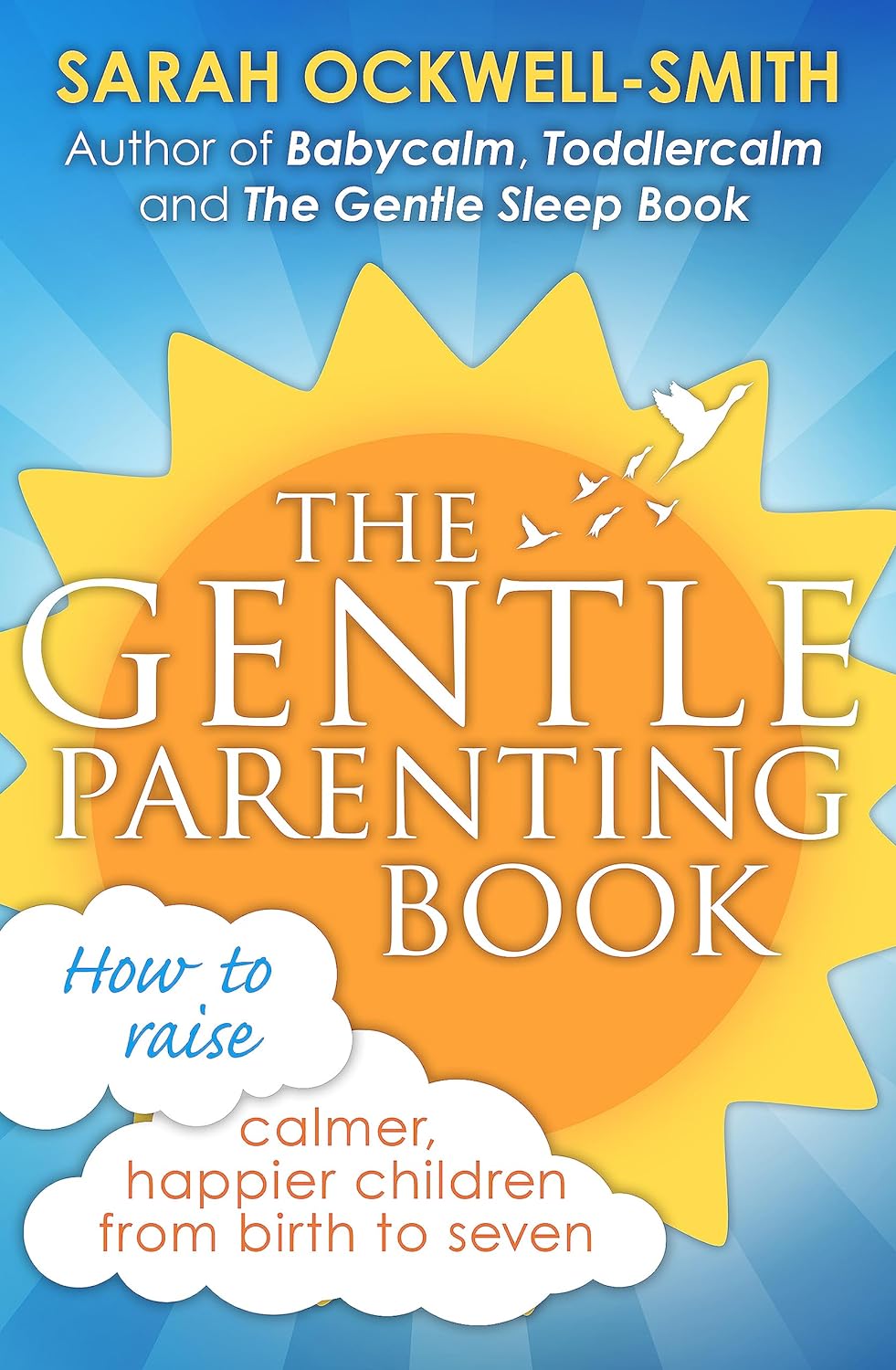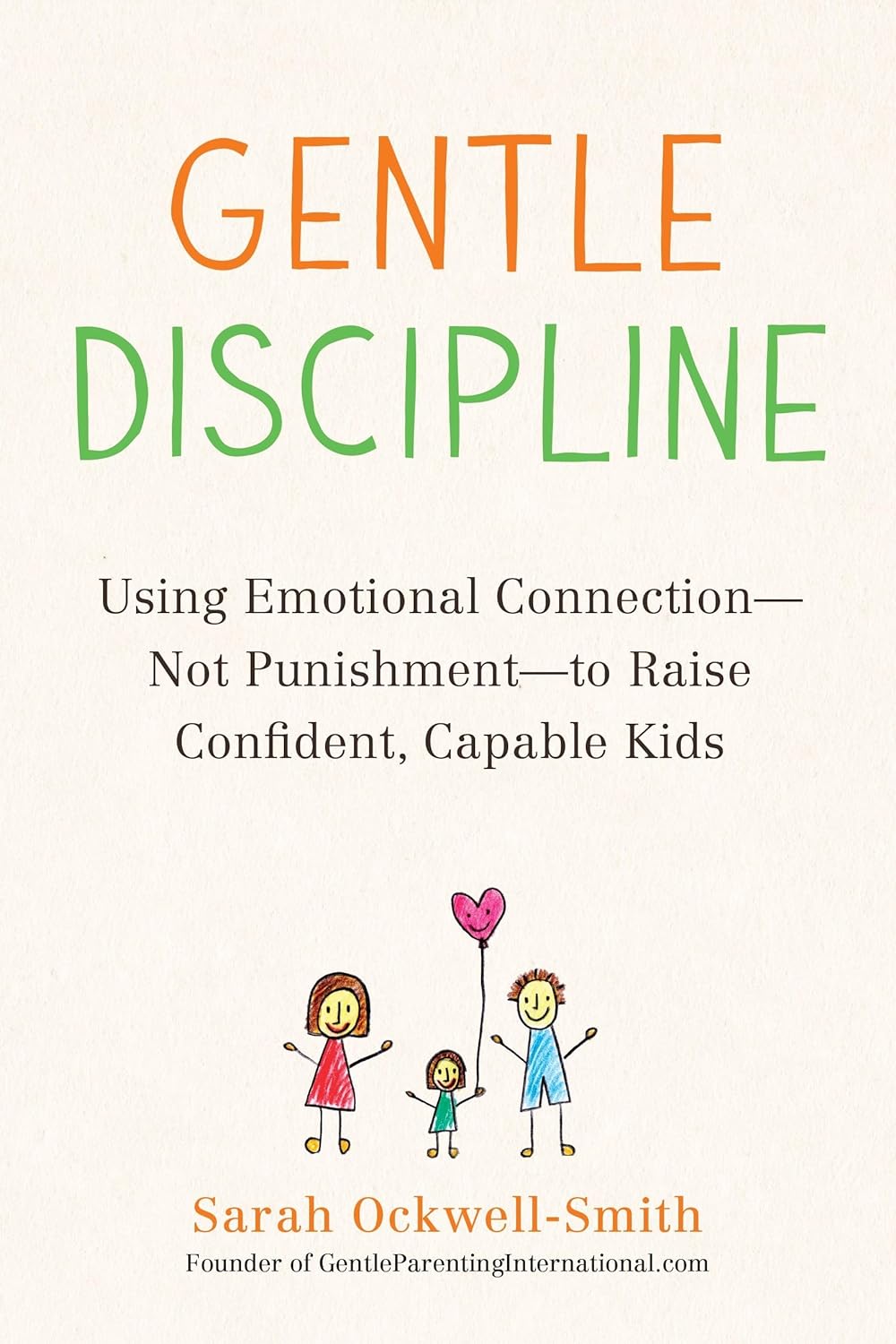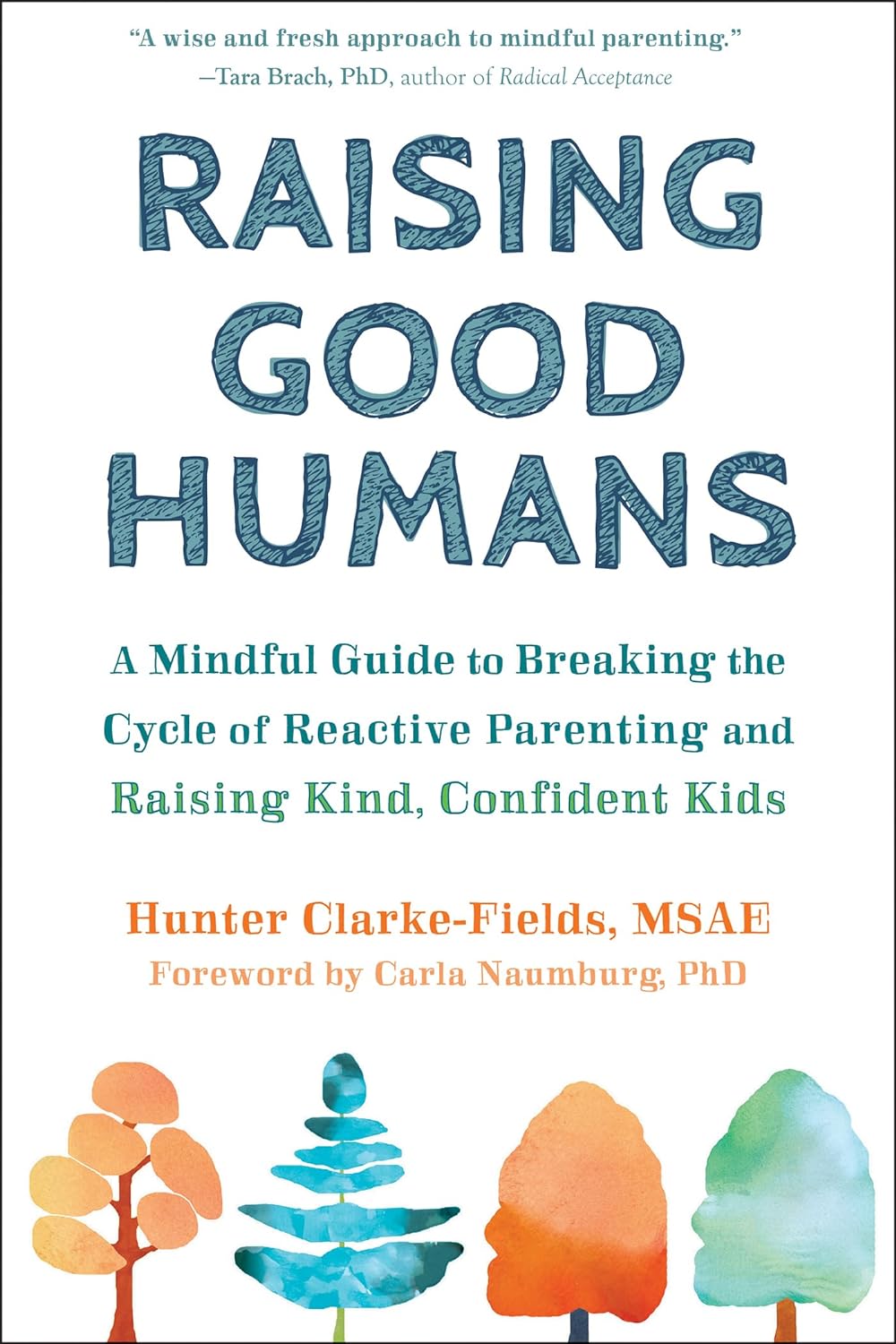Overview: What Is Gentle Parenting, How Does It Work, & Why Use It?
“Many parents see behavior as the measure of who our kids are, rather than using behavior as a clue to what our kids might need.” – Dr. Becky Kennedy, a child psychologist and author of “Good Inside: A Guide to Becoming the Parent You Want to Be” (1)
This quote can relate to gentle parenting.
This parenting style fosters mutual respect, empathy, boundaries, and understanding, explains “The Gentle Parenting Book” author and parenting expert Sarah Ockwell-Smith. (2)
By encouraging better parent-child relationships and communication, gentle parenting can help you raise kids without blaming, shaming, or punishments. There are no “time-outs” in this parenting style. (2)
Instead of punishing a child for negative or challenging behavior, the gentle parenting approach seeks to understand what caused it and find a solution by talking to the child. It’s more of a partnership or collaboration with your child. (2)
This parenting method doesn’t work with reward (for good behavior) and punishment (for bad behavior). Instead, it helps improve your child’s self-awareness and lets them understand their own behavior. (2)
The gentle parenting style helps you recognize your child’s “triggers” for bad behavior and plan ahead how to deal with them. (2)
Below, we’ll discuss some gentle parenting techniques for dealing with your child’s behavior, such as handling meltdowns at the grocery store or other real-life situations. We’ll also debunk some myths about gentle parenting and offer tips on making this parenting style work.
We’ve also added concerns and possible drawbacks to this parenting philosophy and explained its benefits in the long run.
What Do Psychologists Say About Gentle Parenting?
Psychologist Jessica Stoltzfus Grady explained in a 2019 Journal of Experimental Child Psychology study, “Findings suggest that parental gentle encouragement may promote regulated responses in social contexts in shy toddlers.” (3)
Grady’s study showed that shy toddlers who were provided gentle encouragement showed more engagement and less fear in moderately threatening social situations (e.g., strangers). (3)
According to Williamsburg Therapy Group child psychologist Irina Gorelik, “The belief of this approach (gentle parenting) is that children are inherently ‘good’ and that difficult behaviors are often a result of emotional dysregulation, or not having access to a better coping skill in the moment.” (4)
Gorelik explained that this parenting style doesn’t mean kids are allowed to do anything they please. She added that many punishments for bad behavior aren’t even directly related to the behavior itself (such as grounding a child for something that happened in school). (4)
“It (gentle parenting) allows parents to set boundaries or limits and be sturdy when needed, while providing a framework for this to be done with validation, support, and helping the child feel seen,” Gorelik added. (4)
Gorelik also explained that this style of parenting lets you understand that certain behaviors might be normal for certain ages. For example, as we’ve explained in our toddler age article, temper tantrums and power struggles are common with 2-year-olds. That’s why this developmental stage is known as the “terrible twos.” (4)(5)
By acknowledging this, you can find ways to deal with the situation in a kinder, gentler, and more understanding way. (4)(5)
What Are The Characteristics Of Gentle Parenting?
What Are The Three Cs Of Gentle Parenting?
The following are the three Cs that may characterize the gentle parenting approach: (6)(7)
- Care (or connection) – Showing your child that you care for them, they’re heard, and you connect with them
- Communication – Fosters a strong parent-child bond
- Consistency – Creating and following boundaries and rules while being gentle yet firm in consistently following them
Facets Or Core Tenets Of Gentle Parenting
Mutual Respect
Gentle parenting is about mutual respect, instead of demanding respect from your child (authoritarian approach). (8)
Kids, no matter how young they are, also deserve respect. Because of this facet, gentle parenting is also called “respectful parenting.” (9)
Empathy & Validation
Even in difficult, challenging situations, parents and other caregivers are encouraged to empathize and understand how a child tolerates frustration based on their developmental capacity. (10)
For example, a toddler in their “terrible twos” may easily feel more frustrated and unable to express themselves than a 4-year-old or older child. (5)
Gentle parenting also means validating your child’s feelings, whether negative or positive. This makes them feel heard. (7)
Based on Ockwell-Smith’s parenting advice, “gentle parents” acknowledge that kids are kids – they aren’t expected to behave as adults. You can teach your child how to express their feelings instead of punishing them when misbehaving (e.g., a temper tantrum). (8)
Understanding & Connection
Open communication and understanding your child’s feelings can help you develop closer connections with your child. (6)(7)
Clear & Healthy Boundaries But Also With Choices
There are still boundaries in gentle parenting. It’s important to set these healthy boundaries and tell your child about them. While this parenting style is “gentle,” it doesn’t mean that kids can overstep these boundaries. (4)
As Gorelik explained above, being firm with these boundaries is essential while allowing your child some choices. (4)
For example, instead of yelling at your child to stop playing with their gadget, give them a choice over who turns it off at the end of the set screen time – you or them. If they continue playing, you can turn it off and tell them that you did it this time because it was too hard for them to do it. However, they must learn to turn it off next time the limit is up. (4)
Gentle Parenting Vs. Other Parenting Styles
What Are The Four Parenting Styles?
While there are several parenting styles, these are the four major approaches (differentiated in the next section): (11)
- Authoritarian parenting
- Authoritative parenting
- Permissive parenting
- Uninvolved parenting
Note that gentle parenting falls under the bigger umbrella of authoritative parenting. (10)
Other parenting sub-groups include:
- Conscious parenting – Promotes using your own awareness, mindfulness, and emotional regulation to make decisions on how you respond to your child; it also encourages mutual collaboration and curiosity (12)
- Positive parenting – Sets clear boundaries but emphasizes positive reinforcement, including encouragement, praise, and active listening (13)(14)
- Peaceful parenting – Similar to gentle parenting but with emphasis on working first on your own emotions to better understand and accept your children’s emotions and behavior (15)
- Helicopter parenting – A child-rearing style that uses overprotection and control, potentially creating a negative impact on your child’s emotional and mental health (e.g., may lead to increased risks for anxiety and depression) (16)
- Responsive parenting – Combination of a traditional, authoritative style with gentle parenting; sets firm boundaries and fosters disciplining your child but with empathy and also acknowledging how they feel (17)
Differences
The following are gentle parenting’s differences from the major parenting styles: (2)
Gentle Parenting Vs. Permissive Parenting
- Gentle parenting: Self-autonomy and individual child development but with clear boundaries and rules (2)
- Permissive parenting: Very lenient with rules or boundaries, allowing kids to do whatever they want (2)
Gentle Parenting Vs. Authoritarian Parenting
- Gentle parenting: Child self-expression, autonomy, and independence (2)
- Authoritarian parenting: Obedience without questions; kids don’t have a say (2)
Gentle Parenting Vs. Authoritative Parenting
- Gentle parenting: Empathy and understanding; doesn’t focus on rewards to motivate your child (2)
- Authoritative parenting: Setting clear rules and expectations, with discipline and positive reinforcement or rewards when needed; still responsive to what your child needs (2)
Gentle Parenting Vs. Uninvolved Parenting
- Gentle parenting: Parents are involved in their children’s lives and collaborate with them on setting rules and understanding their behavior (2)
- Uninvolved parenting: Akin to neglectful parenting; parents want nothing to do with their children, whether in their academic life, behavior, or emotional and mental needs (2)
Gentle Parenting Shares Similar Characteristics With Other Parenting Styles
Gentle Parenting Falls Under Authoritative Parenting
Although often viewed as “permissive,” gentle parenting is considered authoritative. The “gentle” part of this parenting approach doesn’t mean “not firm.” Instead, it means “not harsh.” It can still be a firm parenting approach while also being “emotionally safe and responsive.” (10)
Gentle Parenting Uses Positive Discipline
Shame, blame, and punishment don’t belong to gentle parenting. Instead, it uses positive discipline to teach your kids right from wrong. (2)(18)
- Involve your child in problem-solving
- Consider a positive approach instead of punishment
- Avoid “time-out” – try “time-in” (talking to them)
- Set logical and natural consequences
- Be an active listener
Effects Of Positive Discipline – Does It Really Work?
Yes, it can. A 2021 Child Psychiatry & Human Development study showed that children of parents who attended a positive parenting discipline program may have better academic performance. (19)
They might also have reduced externalizing (hyperactive or disruptive) behavior. (19)
Gentle Parenting Incorporates Attachment Parenting
Some elements of attachment parenting are also used in gentle parenting, such as fostering secure attachment bonds with your child through empathy and validation. With both parenting approaches, you can develop a strong parent-child bond. (20)
However, the two parenting styles are distinctly different, with attachment parenting more applicable for babies (e.g., skin-to-skin contact, responsiveness to cues, etc.). In contrast, gentle parenting is more suitable for toddlers and older kids. (20)
Gentle Parenting Incorporates The Montessori Approach
Both parenting styles aim to understand the “why” behind a child’s behavior and help them learn how to handle a certain situation instead of punishing them. (21)
They also promote mutual respect and empathy and encourage your child through internal motivation instead of using an external prize to reach their goals. (21)
However, the Montessori method focuses more on educational principles, making it a more comprehensive approach. For example, teaching through positive discipline also helps your child learn practical life skills. (21)
Gentle Parenting Pros & Cons
Pros & Benefits
Can Motivate Your Child
Gorelik explains that using gentle parenting correctly can help your child develop independence, self-esteem, confidence, and strong emotion regulation skills. (4)
Kids Learn To Empathize
Empathy is one of the major tenets of gentle parenting. (2)
By teaching your child self-regulation and empathizing with them, you also teach them about empathy. This can help them learn how to be in tune with others. (22)
Learning Positive Social Skills
The 2019 Journal of Experimental Child Psychology study by Grady (mentioned above) showed that shy kids showed marked improvement in their social skills with gentle parenting. (3)
Helps Reduce Anxiety
By fostering respect and empathy, you can teach your child that they’re equal and heard and don’t have to hide their emotions, even the difficult ones. They may also learn their value as individuals. These can help improve their mental well-being and reduce anxiety or depression. (23)
Improves Your Parent-Child Bond
Gentle parenting helps improve your parent-child bond while also reducing power struggles. It can also help enhance your communication with each other. (4)
Other Gentle Parenting Benefits
Aside from improved parent-child relationships, this parenting approach might also boost your child’s relationship with other family members. (4)
What Are The Downsides & Cons Of Gentle Parenting?
Need To “Unlearn” & Learn Many Different Things
Gentle parenting is a modern take on authoritative parenting that differs from what you might have experienced with your parents. Many of the parents in today’s generation experienced authoritarian parenting. (24)
Yelling and screaming might have been the norm with previous generations, but these are generally avoided with gentle parenting. (24)
Can Focus On One Child’s Feelings Rather Than Directly Correcting A Wrong Action
Instead of yelling “Stop it!” to a misbehaving child, gentle parenting recommends processing their emotions and understanding why they did something they weren’t supposed to. Critics of the parenting style believe it focuses more on the child’s feelings rather than making them responsible for or correcting a wrong action. (24)
Instead of punishing a wrong action, “gentle” parents may tend to distract a child and find another fun thing to do. (24)
Other critics question why this parenting style focuses on one child as an isolated unit without thinking about what the other child or kids feel. For example, a child who keeps hitting their sibling might be doing this because they feel misunderstood. So, the solution is to make them feel accepted. Yet scripts aren’t provided about how to process the other child being hit. (25)
Can Take A Lot Of Time
Common examples (or scripts) for gentle parenting involve parents processing their children’s feelings and teaching them to empathize even in simple situations, such as turning their gadgets off or tying their shoes to get out the door. But these can take a lot of time – and some critics believe it can be unrealistic in real-life situations. (25)
Can Be Stressful To Parents
Gentle parenting can be stressful to parents because you feel like you have to get it right 100%, yet you can’t realistically drop everything you’re doing to process every situation with your child. (25)
Misinterpreted Approach Can Lead To Incorrect Application
When the gentle parenting approach is misinterpreted, it can lead to incorrect application, such as having no rules, Gorelik explains. (4)
However, this incorrectly interpreted style is no longer “gentle parenting” but “permissive parenting.” (2)
May Increase Challenging Behavior For Attention
Sometimes, kids misbehave because they want attention. Because gentle parenting encourages talking to your child about their behavior and feelings, you might accidentally “reward” their misbehavior. They might misbehave on purpose to spend more time with you. (24)(25)
Common Misconceptions On Gentle Parenting
#1: You’re Viewed As a Friend, Not An Authoritative Parental Figure
Pediatrician Karen Estrella explains that this is a common misconception. However, you can remain an authoritative parent who can help your child improve their behavior out of empathy, not fear. (26)
#2: It Needs Sunshine, Rainbows, & Happy Times
Gentle parenting can also work in tougher times or more challenging behaviors. What’s important is that you can develop a strong bond with your child to help you handle these situations. (4)
#3: It’s Permissive Parenting That Lets Kids Do Whatever They Want
Gorelik explains that this parenting approach isn’t about appeasing your child or “giving in” to their negative behavior. It isn’t about letting your child do whatever they want. (4)
Instead, it helps set clear limits and boundaries while also understanding that children can have certain behaviors or emotional responses at certain ages. (4)
#4: It’s Only For “Gentle” Children, But Doesn’t Work For Strong-Willed Ones
Anecdotes from “gentle” parents on blogs, podcasts, or social media show that gentle parenting can also work for strong-willed kids. Things might be more challenging, but by understanding how they feel, you can help them process their emotions and learn to empathize with others. (27)
Mom and parenting book author Angela Anagnost-Repke shared that when her daughter calmed down after one of her fits, she told her that her feelings are always valid. However, she was also taught that it’s not okay to explode onto other people (as she did earlier). (27)
Applying Gentle Parenting With Your Kids
Be A Model For Kindness & Calm Behavior
Ockwell-Smith encourages parents to start on themselves to learn how to stay calm and find a way to understand their kids. Start by identifying, understanding, and finding ways to deal with stressors or triggers. (8)
Your child can learn and emulate how you behave by keeping a calm demeanor and modeling kindness. (4)
Invite Your Child To Work Together Instead Of Commanding Them
One way to build a strong connection with your child is through working together to solve something instead of commanding them to do it. (18)
Reprimand Or Correct The Action Or Behavior, Not The Person
When a child misbehaves, try not to comment on the actual behavior or action instead of reprimanding the person. For example, “You’re being mean” focuses on the person making a mistake. Instead, focus on the actual behavior because mistakes can happen and they don’t define a person. (28)
Handling Dangerous Situations
Experts suggest staying calm and not imposing discipline during dangerous situations. Remove the child from the situation at the height of danger or call 911 if applicable. (29)
When the danger has subsided, they suggest redirecting your child towards a pleasant, calming activity (e.g., listening to music or sorting a deck of cards). (29)
Handling Temper Tantrums
Understand that kids, especially toddlers, might have tantrums because they struggle to express their feelings. To handle a tantrum, stay calm, listen, and validate their feelings. Find the root cause of their frustration and explain why they can’t have their way with it. (4)(30)
Using Gentle Parenting In Common Situations

Sibling Fight Or Rivalry

Store Tantrums
Situation: Your child wants a toy during a regular grocery shopping trip: (31)

Bedtime Power Struggle
Sometimes, you can still experience power struggles even if you’ve established a calming bedtime routine.
Instead of forcing your child to sleep, involve them in the decision-making process within your set boundaries. For example, ask whether they want to read one or two books for the night or give them a choice over which stuffed animal they want to take to bed. (32)
You can also tell them the importance of sleep and the natural consequences they might experience (e.g., feeling too tired the next day) if they don’t go to bed early.
What If Your Child Keeps Doing Something Even If Repeatedly Told Not To Do It?
Take a step back and examine why your child is doing it. Instead of telling your child, “Don’t do this” or “Stop doing that,” try turning the command into a positive suggestion. (33)
“How about you try doing this after you do that?” might have a positive effect and make them stop repeating the same thing. (33)
Practicing Gentle Parenting For Different Ages & Developmental Stages
Gentle Parenting For Babies
Although they’re still small, babies are actually smart and can understand, to some extent, when things are explained to them. At this age, they might do certain things, such as kicking, throwing food from their high chair, or throwing tantrums. (34)
Practice gentle parenting through “time in.” Take your baby in your arms or put them on your lap, and let them express themselves. In short, let them cry it out. Sometimes, crying or tantrums might be their way of releasing overwhelming emotions because they can’t talk yet. (34)
Your baby can learn to trust you when you “listen” to what upsets them. (34)
Aside from discipline, you can also apply gentle parenting with your baby through play. You can form stronger bonds when you play and do activities together. (34)
Gentle Parenting For Toddlers & Young Children
Try to understand your child’s feelings and help them find ways to express themselves without hitting, punching, or misbehaving. Many of the examples mentioned above apply to toddlers and young children. (2)(31)(32)
Here’s a guide to talking to kids and adolescents about their mental health.
How To Improve Success With Gentle Parenting
- Plan about how to deal with negative behavior
- Promote teamwork
- Stay positive and calm
- Get everyone on board
- Set limits or schedules – and be consistent
Is Gentle Parenting Ideal For You?
Many who tried gentle parenting (or observed others doing it) will agree that it can be hard and time-consuming. It requires conscious parenting or first understanding yourself and coming to terms with how your own parents raised you with their different parenting approaches. (24)(25)
You can try the methods and samples we share above to see if this parenting style works for you. Another way is to talk to a parenting coach for guidance.
And if you think gentle parenting isn’t ideal for you and your kids, it’s okay. There are other parenting styles to consider – and all have the same goal of helping you raise your kids to the best you can.
How To Transition To Gentle Parenting
Some tips to get you started: (13)
- Practice understanding, patience, and staying calm
- Focus on active listening and empathy
- Dedicate your time to listen to your kids and understand their feelings
- Learn more about gentle parenting through books and other resources (such as our article)
- Get others on board, including your partner and other family members
How To Handle Parent Guilt
Ockwell-Smith and other parenting coaches recommend the following: (8)(24)
- Understand that it’s acceptable to make mistakes even as a parent.
- Share the parenting “mental load” more equally with your partner.
- Acknowledge that following parenting advice or certain styles doesn’t mean always aiming to be perfect.
- Learn to express when you need time out and feel you’re “at capacity.”
- Accept that no parenting style is perfect, and what’s more important is that you provide your child with a highly nurturing environment with healthy expectations to make them feel secure and loved.
What To Do If You’re Frustrated Or Exhausted
Some tips to help you cope: (35)
- Get some sleep.
- Recognize that you don’t have to be productive at all times; postpone productivity so you don’t feel stressed out, which can shorten your patience and make you lash out at your child.
- Practice mindfulness and learn to stay calm.
- Find ways to rest and relax (sometimes, playing games might help).
Millennial Parenting Vs. Mainstream Or The Previous Generations’ Parenting
Many millennial parents (and other parents of this new generation) underwent authoritarian discipline. In previous generations, physical force might have been acceptable as a form of discipline. Learning from those experiences and knowing how it felt to be spanked or yelled at, millennials value positive discipline rather than punishment. (36)
Today’s parents might prefer authoritative discipline with positive reinforcement and time out rather than punishing negative behavior. (36)(37)
Social media might also influence some millennials in their parenting style. Many learn through online support groups or blogs about parenting and how to deal with certain situations. (37)
Today, there are several parenting styles (see our list above) – and many new parents might use several styles. Many of today’s young parents, whether millennials or Gen Zs, strive to empathize with their children. (37)
Resources: Positive & Gentle Parenting Books
“The Gentle Parenting Book” – by Sarah Ockwell-Smith
“Gentle Discipline” – by Sarah Ockwell-Smith
“Good Inside” – by Dr. Becky Kennedy
“Raising Good Humans” – by Hunter Clarke-Fields MSAE
References
(1) https://www.goodreads.com/work/quotes/93719359-good-inside-a-guide-to-becoming-the-parent-you-want-to-be
(2) https://www.choosingtherapy.com/gentle-parenting/
(3) https://www.sciencedirect.com/science/article/abs/pii/S0022096518304764?
(4) https://www.cnbc.com/2022/10/23/4-questions-about-gentle-parenting-answered-by-a-child-psychologist-.html
(5) https://www.chhs.niu.edu/child-center/resources/articles/terrible-twos.shtml
(6) https://bedtimeboardgame.com/blogs/news/practice-the-3-cs-of-gentle-parenting-with-us
(7) https://www.bridgescounselling.com.au/parenting-skills-counselling/
(8) https://www.cnbc.com/2021/10/25/this-gentle-parenting-guru-gives-her-tips-for-raising-confident-kids.html
(9) https://www.suchalittlewhile.com/respectful-parenting/
(10) https://www.psychologytoday.com/intl/blog/on-babies/202405/gentle-parenting-doesnt-mean-permissive-parenting
(11) https://www.ncbi.nlm.nih.gov/books/NBK568743/
(12) https://www.choosingtherapy.com/conscious-parenting/
(13) https://ellerose.co.uk/a-quick-guide-to-positive-parenting-vs-gentle-parenting-in-2024/
(14) https://health.ucdavis.edu/children/patient-education/Positive-Parenting
(15) https://www.peacefulparenthappykids.com/guide/peaceful-parenting
(16) https://www.ncbi.nlm.nih.gov/pmc/articles/PMC9176408/
(17) https://www.cnbc.com/2023/12/31/47percent-of-parents-want-to-be-more-consistent-with-discipline-in-2024.html
(18) https://learningwithkelsey.com/blogs/news/gentle-parenting-tips
(19) https://www.ncbi.nlm.nih.gov/pmc/articles/PMC9560916/
(20) https://lucyathome.co.uk/gentle-parenting/attachment-parenting-gentle-parenting-different/
(21) https://sapientiamontessori.com/montessori-activities/how-does-montessori-compare-to-gentle-parenting/
(22) https://parentingscience.com/teaching-empathy-tips/
(23) https://lucyathome.co.uk/gentle-parenting/gentle-parenting–mental-health-immunity/
(24) https://lawliberty.org/the-case-against-gentle-parenting/
(25) https://familyman.movember.com/fr-ca/articles/what-is-gentle-parenting/#
(26) https://health.clevelandclinic.org/what-is-gentle-parenting
(27) https://www.mother.ly/life/motherly-stories/gentle-parenting-strong-willed-child/
(28) https://www.guidepostmontessori.com/blog/beginners-guide-gentle-parenting
(29) https://www.ocali.org/up_doc/Dangerous_Behavior_Guide.pdf
(30) https://www.teach-through-love.com/temper-tantrums.html
(31) https://www.cnbc.com/2022/10/25/3-scripts-for-gentle-parenting-conversations-from-a-child-therapist.html
(32) https://www.positiveparenting.com/bedtime-without-struggling/
(33) https://parentstoolshop.com/why-kids-do-what-you-tell-them-not-to-do-how-to-prevent-defiant-children-power-struggles-and-tantrums/
(34) https://www.positiveparentingconnection.net/discipline-for-babies/
(35) https://www.cedarhillprep.com/does-gentle-parenting-make-parents-feel-more-anxious/
(36) https://www.kindercare.com/content-hub/articles/2016/may/millennial-moms-dads-6-ways-theyre-raising-kids-differently
(37) https://www.parents.com/what-your-generation-says-about-your-parenting-style-8551260
















